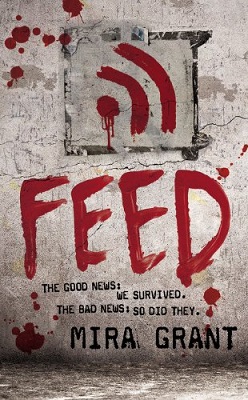Feed (Grant novel)

First edition worldwide cover
|
|
| Author | Seanan McGuire (writing as Mira Grant) |
|---|---|
| Country | United States |
| Language | English |
| Series | Newsflesh Trilogy |
| Genre | Science fiction/horror |
| Publisher | Orbit Books |
|
Publication date
|
2010 |
| Media type | Print (Paperback), Ebook (Kindle) |
| Pages | 599 pp |
| ISBN | |
| Followed by | Deadline |
Feed is the first book in the Newsflesh series of science fiction/horror novels written by Seanan McGuire under the pen name Mira Grant and published by Orbit Books in 2010. Set during the aftermath of a zombie apocalypse and written from the perspective of blog journalist Georgia Mason, Feed follows Georgia and her news team as they follow the presidential campaign of Republican senator Peter Ryman. A series of deadly incidents leads Georgia and her brother Shaun to discover efforts to undermine the campaign, linked to a larger conspiracy involving the undead.
McGuire's interests in horror movies and virology inspired her to write the book, but she struggled with the plot until a friend suggested using an election as a framing device. The novel has been praised for its detailed worldbuilding, including the characters' awareness of previous zombie fiction—an element McGuire had found lacking in most horror works. Feed came second in the 2011 Hugo Award for Best Novel category. Deadline is the second book in the Newsflesh series. Just before the third installment, Blackout (May 22, 2012), was published, McGuire released an alternate ending to Feed.
Feed is set several decades after the zombie apocalypse, referred to as the Rising. Two man-made viruses (a cure for cancer and a cure for the common cold) combined to form Kellis-Amberlee, a virus that quickly infects all mammalian life. Kellis-Amberlee is normally beneficial, but the virus can "go live" or "amplify", converting any host mammal over 40 pounds (18 kg) into a zombie. There are three mentioned ways amplification takes place: the death of the host, contact with a live specimen (being bitten by a zombie) and spontaneous conversion. Those infected that have not undergone amplification remain lucid until the virus has time to spread through the body. Lucidity is followed by lack of sensitivity to pain, memory loss and finally conversion.
...
Wikipedia
